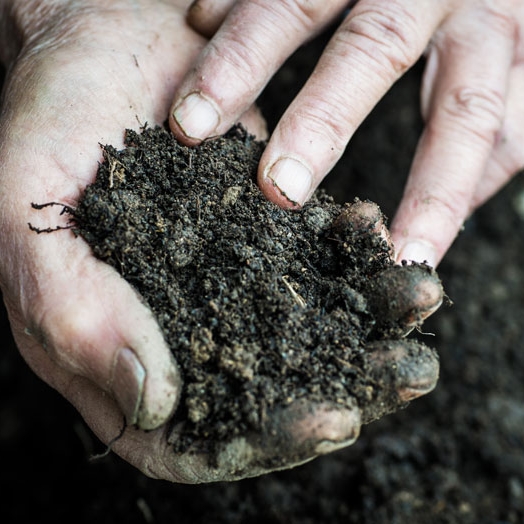
VINEYARD
Location
Right in between Los Angeles and San Francisco and just south of Paso Robles and north of San Luis Obispo, the estate vineyards are situated on a saddle ridge atop a nobby hill in the middle of a vortex thats known as the Templeton Gap. Cool Pacific Ocean air filters through the Santa Lucia Mountains along the central coast and gets pulled almost every day into the Creston Valley extending West to East, making our appellation 5 or more degrees cooler than surrounding areas. This wind also helps keep the vines dry and free of mildews and molds and doesnt allow large colonies of bugs to establish throughout the growing season (which helps with our theories of farming). Steep hillsides allow the plants to extend their dry farmed roots into ancient substrate of sedimentary rock and deposits of Limestone, Sandstone, Calcarous Clays, and Clay Loam. A mixture known as Linne Calodo. This minerality and acidity the vines extract from the ground can easily be identified in our estate wines.
Biodynamic Farming
Biodynamics is a farming method made popular by philosopher Rudolf Steiner through a series of lectures given to farmers and landowners in 1924. Biodynamic agriculture arose out of a response to the widespread use of commercial fertilizers and the observations of soil depletion by farmers just after the turn of the century. It is now gaining increased attention for its emphasis on superior food quality and soil health. It is an approach to agriculture in which the whole of creation (the cosmos)—the air, water, soil, sun and moon are interconnected and thus play a role in every action taken upon our land. It is holistic, natural and healing.
We apply homeopathic doses of naturally occurring plant and animal materials to our compost pile, our vines and the soil in the vineyards and orchards. Biodynamic farming not only encourages the elimination of all chemicals used in farming, but encourages the farmer to pay close attention to the forces of nature influencing his/her farm entity.
Demeter Certified Biodynamic Wines
AmByth Estate is Paso Robles’ First Winery to Produce Demeter Certified Biodynamic Wines. We gained our certification from the Demeter Association in 2006. We utilize the Biodynamic method of farming to enhance our observations of nature, and use these intimate insights as tools that allow our 20 acres of vineyards to express their true character through the grapes it produces. We want our grapes to be as unique to AmByth Estate as your thumbprint is to you. The estate consists of 20 acres of vineyards and 600 olive trees dedicated to Biodynamic farming principles since their initial planting. 20 acres of untouched oak forests surround the vineyards.
At the heart of Biodynamic farming is the commitment to create a self-sustaining and diverse estate. We are a vineyard farm! A vital role to sustaining farmed land is the use of aged compost, inserted with the Biodynamic preparations, and applied yearly. This compost fertilizes, rejuvenates and enlivens the soil, creating healthy plants, balanced ecosystems and exceptional crop production. We also believe in the integration of farm animals, bees, olive trees, fruit & nut trees, vegetable gardens and landscaping with edible plants and California natives with extreme minimal-to-zero use of water.
THE VINES
We have 4 vineyards within the 42 acre estate, (20 planted plus 22 acres of woodlands). All vineyards are dry-farmed, head-trained, thus reducing our dependency on irrigation and energy. They are steeply sloping, requiring much of the work to be accomplished on foot. We believe all of these factors influence the depth and unique character of the wines of AmByth Estate. Our vineyards: Mark’s Vineyard, StoneCross, Terrace, & PlayGround. Our varietals: Mourvedre, Grenache, Syrah, Counoise, Tempranillo, Sangiovese, Roussanne, Marsanne, Viognier, & Grenache Blanc. About 1/3 of the vines are own root with the balance being 110R and 1103P.About 1/3 of the vines are rooted with the balance being 110R & 1103P.
THE SOIL
Our soil is classical Paso Robles Linne Calodo, a recessed sea bed composed of sandy calcareous clay loam with mineral rich shale and chunks of limestone. Every season our soil is rejuvenated with our own aged compost inoculated with biodynamic preps.
THE CHICKENS
How lucky our chickens are! The portable coop is moved daily throughout the vineyards allowing the chickens to range freely among the vines, eating insects, and scratching the soil while fertilizing it at the same time with their manure. They mix with the dogs and the cats, making themselves right at home. The chickens’ eggs are used daily to feed our families and winery guests during wine events.
THE LIVESTOCK
We believe cows & sheep, especially female cows with horns intact, strengthen our farm with their presence. They enliven the land with their valuable manure, aerate the soil with their hooves, and are an excellent source of weed control. We let them loose in the vineyard during the winter months to mow the cover crop and wild grasses that grow.
THE BEES
We keep bee hives in the middle of the estate, between Mark’s Vineyard and StoneCross. The bees play a vital role in pollination throughout our estate: pollinating our gardens, fruit & nut trees and native landscape plants. The gentle buzz of their flight from flower to flower is music to our ears. We are very sensitive to plants that attract bees, as a result, we leave many weeds throughout the vineyards and estate just for them to enjoy.
OLIVE, FRUIT & NUT TREES
Part of our plant diversity and development of natural habitats for predators is the integration of trees. We have 600 Spanish varietal olive trees, and we produce dry-farmed, estate Biodynamic Extra Virgin Olive Oil, that is for sale at the winery. We always have oil cured olives on hand in the tasting room. We also have over 100 fruit and nut trees.
Water Conservation
Paso Robles has been and will probably always be in a water shortage. People have had to drill deeper in order to get ground water because 15-20 inches of rain a year average does not cover their needs. Apart from lack of water and being responsible, we chose to dry farm (completely no irrigation) to produce incredible terrior-driven fruit that has the characteristics to produce natural wine naturally.
Biodynamic Specifications
Specific Requirements for Biodynamic Farms Include:
· No use of chemically synthesized fertilizers, herbicides, pesticides, fungicides, no hormones, antibiotics, growth regulators or GMOs.
· The farm must be free of prohibited inputs for 36 months, and under biodynamic management for 12-24 months.
· Demeter certified farms are personally visited, inspected and re-evaluated annually to maintain the integrity of the certification.
· An emphasis is placed on integration of livestock, recycling of nutrients, maintenance of the soil and the health of all crops and animals.
· Use of the biodynamic preparations to enhance soil quality and stimulate plant life: horn manure, horn silica, yarrow, chamomile, stinging nettle, oak bark, dandelion, valerian and horsetail.
· The use of biodynamic compost as a way to recycle animal manures and organic wastes, stabilize nitrogen, build soil humus and enhance soil health.
Specific Requirements for Biodynamic Wines Include:
· Fermentation must be from indigenous yeasts from the vineyard site, no added yeasts permitted.
· All pomace and seeds are ecologically recycled by returning them to the farm.
· Acidity and sugar adjustments are not permitted.
· Maximum of total sulfites added for a bottled wine cannot exceed 100 ppm. (But we use none!)
We are inspected annually by the non-government owned certification organizations of CCOF (organic) and Demeter (biodynamic) to oversee the strict adherence to farming and wine making principles, this ensures the integrity of our products. Please see www.demeter-usa.org & www.biodynamics.com for more information.






